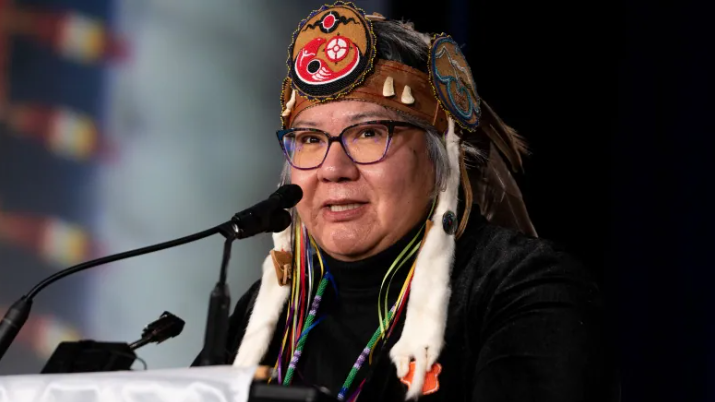AFN chiefs adopt unified front, demand Ottawa pay ‘minimum’ of $20B to child welfare survivors

Retired senator Murray Sinclair combined competing resolutions and ushered in new position
Assembly of First Nations chiefs agreed to set their differences aside and demand Canada immediately compensate people harmed by the underfunded on-reserve child-welfare system, in an 11th hour show of unity on Wednesday night in Ottawa.
Delegates gathered for the AFN’s annual winter assembly heard impassioned pleas as they mulled whether to back a $20-billion class-action settlement agreement or the Canadian Human Rights Tribunal, which refused to approve the deal.
But following an intervention from retired senator and former Truth and Reconciliation Commission chair Murray Sinclair, the chiefs agreed to combine competing resolutions and present the Canadian government with a unified front.
The new resolution, which passed following hugs and tears, urged Canada to place “the minimum of $20 billion” earmarked for compensation into an interest-bearing account — and then immediately compensate all victims covered by both the tribunal’s rulings and the class action.
“I want to say how honoured I am that we were able to bring together the children and families — those who have been hurt by Canada,” said Cindy Blackstock, executive director of the First Nations Child and Family Caring Society as she received a standing ovation for her dedication to the cause.
Earlier in the day, Carolyn Buffalo, one of the lead plaintiffs advancing the class action, was also met with applause as she urged the chiefs to “put politics aside” and do what’s best for children.
“This is not about any one of us. It’s not about any one person. It is not about any organization. It’s about the kids and their families,” she said.
“So let’s get this done. No fighting.”
Buffalo’s son Noah Buffalo-Jackson, another lead plaintiff, has cerebral palsy and requires a wheelchair, round-the-clock care and special equipment in his home.

Buffalo-Jackson represents youngsters denied essential services that should’ve been available under what’s known as Jordan’s Principle. His mom represents families like theirs who have suffered while struggling to access the care they need.
Buffalo spoke during a plenary on the $20-billion settlement and a separate proposed $20-billion deal on long-term reform of the child-welfare system, which together form the Canadian government’s proposed $40-billion pledge to resolve a long-standing human rights complaint.
Make sure ‘no child is left behind,’ says Blackstock
Blackstock filed the complaint along with the AFN in 2007, but they took opposing views on the compensation issue until Wednesday’s resolution passed.
“We can make sure that in our First Nations canoe of justice, no child has to see their money go away, and no child is left behind in justice. We are capable of that,” Blackstock told the chiefs before the vote.
“We’ve gotten this far together, and we’re not that far from crossing that finish line together. We are going to show our kids that we love them enough to fight for them, and we love them enough to make sure that fight’s done in a way that honours them, and that’s a yes/and strategy.”

The tribunal upheld the human rights complaint in 2016. It ordered Canada to pay the statutory maximum of $40,000 to children and their families harmed by the discrimination between 2006 and now. The federal parliamentary budget office estimated it would cost $15 billion to obey the order and pay the compensation.
Blackstock’s organization argued children entitled to compensation under the tribunal’s standing order would be left out of the class action, a position the tribunal agreed with.
The class action promises $20 billion for class members who were harmed between 1991, which is when the discriminatory policy came into force, and now.
- ‘Herstory’ made as leaders adopt resolutions that promote gender equality, inclusivity at AFN
- Ottawa, AFN file court challenges on tribunal’s decision to reject $20B child-welfare deal
So while the class action leaves out some the tribunal order would compensate, the class action also brings other people in, said AFN general counsel Stuart Wuttke.
“The argument that we should accept the tribunal because it’s perfect? It’s not perfect. It’s far from it,” he told the chiefs.
“People are saying that the AFN settlement agreement leaves people behind; the tribunal orders leave a bunch of people behind. Let’s work together, fix the gaps.”
Related News
Trade war, slumping border traffic: What does that mean for the Gordie Howe bridge?
Amid U.S. President Donald Trump’s tariffs which have triggered a trade war with Canada, cross-border trips haveRead more
Trump administration threatens Harvard’s foreign enrolment, tax-exempt status
U.S. Homeland Security Secretary Kristi Noem speaks during an event on April 9, in Washington,Read more
